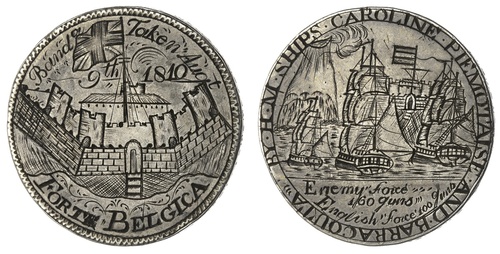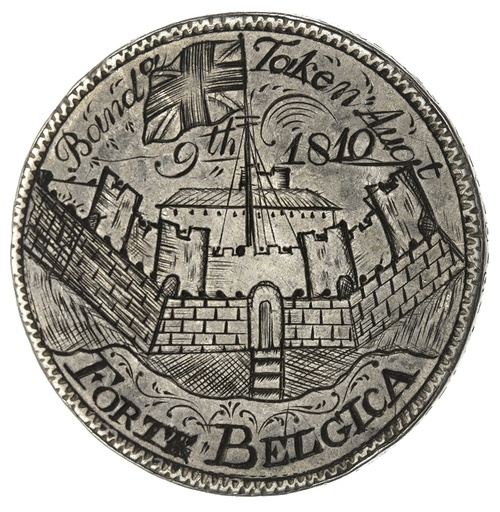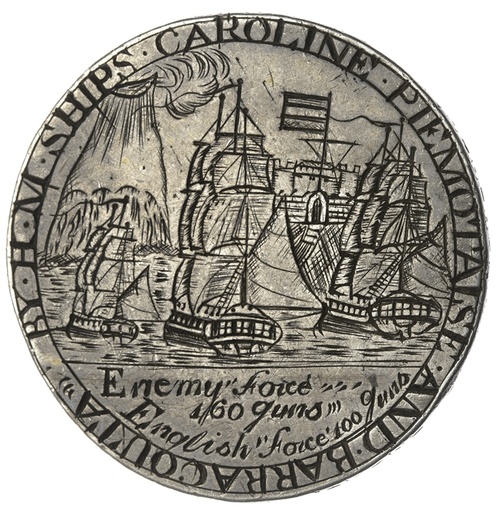Auction: 374 - The Numismatic Collector's Series Sale at NYINC
Lot: 244
Indonesia, Maluku Islands (Moluccas), temp. Napoleonic Wars: The Invasion of the Spice Islands and Seizure of Dutch Colonies by British Forces (February - August 1810), Commemoration of the Capture of Banda and the Siege of Fort Belgica, 9 August 1810, privately engraven on a Spanish 8-Reales, the security edge all that remains of the undertype, 22,19g, 12h, Banda Taken Augt 9th 1810, FORT[E] BELGICA surrounding a depiction of the and the raised Union Flag, rev. BY H. M. SHIPS CAROLINE PIEMOTAISE [sic] AND BARRACOUTA '", the two frigates Caroline and Piémontaise, and brig-sloop Barracouta entering the harbour, Enemy forces 160 guns. English forces 100 guns. in exergue below, a remarkably intricate and expensive personal memento of a celebrated engagement of the Royal Navy, Marines and personal exploits of Sir Christopher Cole, a pleasingly good very fine, a fascinating historical curiosity, and presumably UNIQUE
New York, Nutmeg and Nathaniel Courthope
With hindsight, the Treaty of Breda (1667) [see lot 162] must be viewed as one of the most defining tactical decisions in human history. Famously sacrificing a claim to an established colony in the New World for a tiny enclave at Palua Run, is the reason today we know the 'Big Apple' as New York and why Indonesia has all but the Royal Dutch blue in its national ensign. As a leading international broadsheet glibly put this exchange: 'one has Times Square, the other electricity for just five hours a day.'
The reason? Spice. More particularly nutmeg, for which Banda and by extension the Dutch East India Company (VOC) enjoyed a lucrative global monopoly. However this came to be threatened on Christmas Day, 1616, when Nataniel Courthope and his illustrious band of 39-sailors would lay claim to the island of Run and its inhabitants for King James I. Constructing a fortress to defend the new source of English nutmeg, the Dutch would lay siege to the island for 1,540 days, until they had killed Courthouse and all the male islanders, exiled and enslaved the women and children, and eradicated every tree on the land mass. Following a further recapture attempt in 1638, the Dutch would conduct annual visits to the Island to ensure no English presence until the Treaty of Breda officially ended the territorial dispute. But such was the impact of Courthope's initial resistance that English claim to the territory became collateral barter, and from which his simple pursuit of nutmeg would gain King Charles II absolute ownership of Manhattan.
Were this not injury enough to Anglo-Dutch relations, the subsequent rise of Bonaparte would revert Holland to a vassal kingdom by 1810, prompting English forces to invade the now Napoleonic-owned 'Spice Islands' and attempt to recapture Banda. Time had not stood still in the intervening two centuries, with the once strategic shoreside fort now seriously imperilled by the growing reach of the British Royal Navy; the force now buoyed by their successes at Camperdown and Trafalgar.
Ironically the contingent sent to recapture Banda included a former French frigate that itself had been captured after a bloody 3-day engagement with HMS St. Fiorenzo.
America today may be a flashpoint by mere mention of the second amendment. In reality, it should be reflecting on the implications of 'Article 3 - uti possidetis' or "what you have, you hold" when the arbitrary line in the sand was drawn on 20 May 1667. At that time British forces held the New Netherlands, and thereby set in motion a butterfly effect that has shaped the course of all of subsequent geopolitical history.
Subject to 20% VAT on Buyer’s Premium. For more information please view Terms and Conditions for Buyers.
Sold for
$3,200
Starting price
$500









